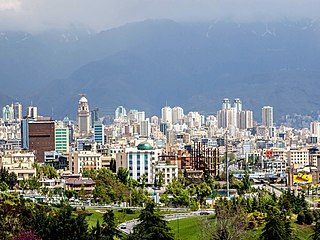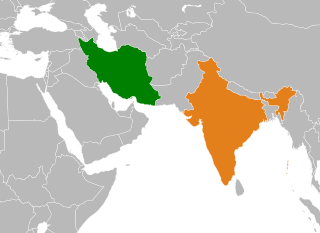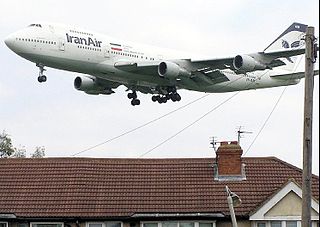
Iran is a mixed economy with a large public sector. Some 60% of Iran's economy is centrally planned. Iran's economy is characterized by its hydrocarbon, agricultural, and service sectors, in addition to manufacturing and financial services, with over 40 industries directly involved in the Tehran Stock Exchange. The stock exchange has been one of the best performing exchanges in the world over the past decade. With 10% of the world's proven oil reserves and 15% of its gas reserves, Iran is considered an "energy superpower".

Iran and the United States have had no formal diplomatic relations since 7 April 1980. Instead, Pakistan serves as Iran's protecting power in the United States, while Switzerland serves as the United States' protecting power in Iran. Contacts are carried out through the Iranian Interests Section of the Pakistani Embassy in Washington, D.C., and the US Interests Section of the Swiss Embassy in Tehran. In August 2018, Supreme Leader of Iran Ali Khamenei banned direct talks with the United States.

India–Iran relations are the bilateral relationship between the Republic of India and the Islamic Republic of Iran. Independent India and Iran established diplomatic relations on 15 March 1950. However, ties between both ancient Persia and ancient India date back millennia. During much of the Cold War, relations between India and the erstwhile Imperial State of Iran suffered due to their differing political interests: India endorsed a non-aligned position but fostered strong links with the Soviet Union, while Iran was an open member of the Western Bloc and enjoyed close ties with the United States. While India did not welcome the 1979 Islamic Revolution, relations between the two states strengthened momentarily in its aftermath. However, Iran's continued support for Pakistan in the India–Pakistan conflict and India's close relations with Iraq during the Iran–Iraq War greatly strained bilateral ties. In the 1990s, both India and Iran supported the Northern Alliance against the Taliban in Afghanistan, the latter of which received overt Pakistani backing and ruled most of the country until the 2001 United States-led invasion. They continued to collaborate in supporting the broad-based anti-Taliban government, led by Ashraf Ghani and backed by the international community, until the Taliban captured Kabul in 2021 and re-established the Islamic Emirate of Afghanistan. India and Iran signed a defence cooperation agreement in December 2002.

National Iranian Oil Refining and Distribution Company (NIORDC) is part of the Ministry of Petroleum of Iran. NIORDC was established on 8 March 1991 and undertook to perform all operations relating to refining and distribution of oil products.

The Ministry of Petroleum (MOP) (Persian: وزارت نفت, romanized: Vezârat-e Naft) manages the oil industry, the producer of oil and petrochemical products. MoP is in charge of all issues pertaining to exploration, extraction, exploitation, distribution and exportation of crude oil and oil products. In addition, according to the "Imports and Exports Regulation Act", issuing import licenses for such products is also among the functions of the Ministry of Petroleum. The ministry has been placed under sanctions by the United States Department of State as of 2020.

United States energy independence is the concept of eliminating or substantially reducing import of petroleum to satisfy the nation's need for energy. Some proposals for achieving energy independence would permit imports from the neighboring nations of Canada and Mexico, in which case it would be called North American energy independence. Energy independence is espoused by those who want to leave the US unaffected by global energy supply disruptions and would restrict reliance upon politically unstable states for its energy security.

Iran–Venezuela relations have strengthened substantially in recent years. "Iran and Venezuela are two friendly and united states which pave their ways to further progress and welfare for their nations", according to President Rouhani. The two countries are contemporary strategic allies of the Russian Federation and the People's Republic of China while opposing U.S. hegemony in their respective regions.

The United States has since 1979 applied various economic, trade, scientific and military sanctions against Iran. United States economic sanctions are administered by the Office of Foreign Assets Control (OFAC), an agency of the United States Department of the Treasury. As of 2017, United States sanctions against Iran include an embargo on dealings with the country by the United States, and a ban on selling aircraft and repair parts to Iranian aviation companies.

Foreign direct investment in Iran (FDI) has been hindered by unfavorable or complex operating requirements and by international sanctions, although in the early 2000s the Iranian government liberalized investment regulations. Iran ranks 62nd in the World Economic Forum's 2011 analysis of the global competitiveness of 142 countries. In 2010, Iran ranked sixth globally in attracting foreign investments.
The 2007 gasoline rationing plan in Iran was launched by president Mahmoud Ahmadinejad's cabinet to reduce that country's fuel consumption. Although Iran is one of the world's largest producers of petroleum, rapid increases in demand and limited refining capacity have forced the country to import about 40% of its gasoline, at an annual cost of up to USD $7 billion.

Petroleum has been a major industry in the United States since the 1859 Pennsylvania oil rush around Titusville, Pennsylvania. Commonly characterized as "Big Oil", the industry includes exploration, production, refining, transportation, and marketing of oil and natural gas products. The leading crude oil-producing areas in the United States in 2023 were Texas, followed by the offshore federal zone of the Gulf of Mexico, North Dakota and New Mexico.

Iran–Switzerland relations are foreign relations between the Islamic Republic of Iran and the Swiss Confederation.

The Iran and Libya Sanctions Act of 1996 (ILSA) was a 1996 act of the United States Congress that imposed economic sanctions on firms doing business with Iran and Libya. On September 20, 2004, the President signed an Executive Order to terminate the national emergency with respect to Libya and to end IEEPA-based economic sanctions on Libya. On September 30, 2006, the Act was renamed the Iran Sanctions Act (ISA). The Act was originally limited to five years, and has been extended several times. On December 1, 2016, ISA was extended for a further ten years.
The Comprehensive Iran Sanctions, Accountability, and Divestment Act of 2010 is a law passed by the U.S. Congress that applies further sanctions on the government of Iran.
There have been a number of international sanctions against Iran imposed by a number of countries, especially the United States, and international entities. Iran was the most sanctioned country in the world until it was surpassed by Russia, following Russia's invasion of neighboring Ukraine in February 2022.

European Union–Iran relations are the bilateral relations between Iran and the European Union (EU). The EU is Iran's largest trading partner, along with China and the United Arab Emirates. Trade with Iran is subject to the general EU import regime and the EU supports the goal of Iranian accession to the World Trade Organization (WTO). The EU has accused and criticized Iran for human rights violations, which led to diplomatic tensions, but both sides aim at improving and normalizing relations. Should Turkey's accession to the EU take place, Iran will border the European Union.

Iran is an energy superpower and the petroleum industry in Iran plays an important part in it. In 2004, Iran produced 5.1 percent of the world's total crude oil, which generated revenues of US$25 billion to US$30 billion and was the country's primary source of foreign currency. At 2006 levels of production, oil proceeds represented about 18.7% of gross domestic product (GDP). However, the importance of the hydrocarbon sector to Iran's economy has been far greater. The oil and gas industry has been the engine of economic growth, directly affecting public development projects, the government's annual budget, and most foreign exchange sources.

Bilateral relations exist between Australia and Iran. Australia has maintained a continuous diplomatic presence in Iran since the Australian Embassy in Tehran was established in 1968. Iran has had an embassy in Canberra since September 1971.

Iran–Kenya relations are bilateral relations between Iran and Kenya.

United Nations Security Council Resolution 2397 is a resolution adopted unanimously on 22 December 2017 in response to North Korea's launch of a Hwasong-15 intercontinental ballistic missile on 28 November of that year. The resolution condemned the launch and further tightened sanctions on the country, restricting fuel imports and other trade, as well as the ability of North Korean citizens to work abroad. On 24 December, the North Korean Ministry of Foreign Affairs stated that the resolution constitutes an act of war.
















